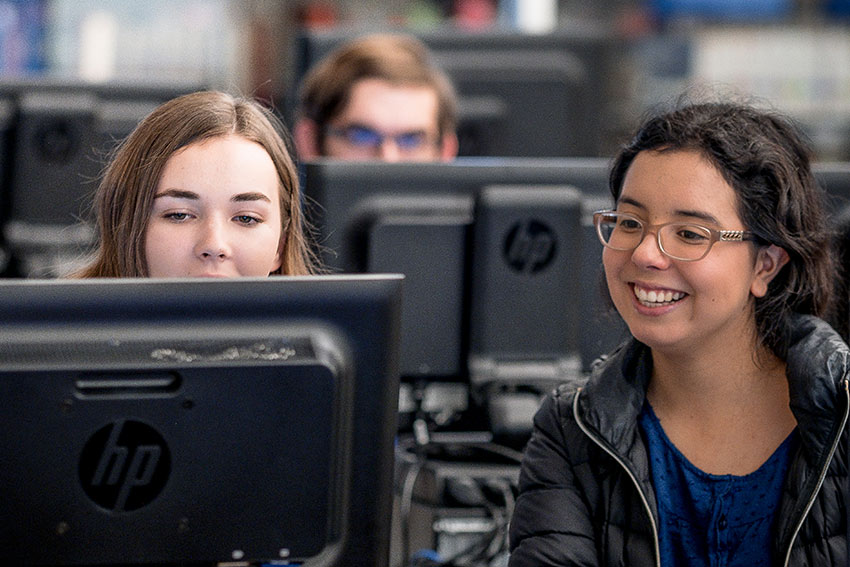19 May 2017
The Next Chapter for Libraries
By Jennifer Davies

A dark computer room at the Central Library in downtown San Diego would seem like the last place a teenager would want to be on a picture-perfect Sunday afternoon.
But that’s exactly where a dozen or so students from around San Diego have chosen to spend their precious Sunday afternoons for the past 10 weeks. Sure, there are beaches, parks, and waterfront venues calling, but here they learn how to unlock the mysteries of programming virtual-reality games.
For Nikolai Trintchoack, attending the virtual-reality course was an obvious choice.
“I’ve done other game development, but I’ve never worked with virtual reality,” said Nikolai, a 16-year-old student from Rancho Bernardo. “I like the programming part. It’s more interesting than the things I do at school.”
The thrust of these programming classes, which are offered through a partnership with UC San Diego Extension and the San Diego Public Library, is to introduce students to cutting-edge technologies and teach sought-after skills to augment the education they are getting at school.
Ed Abeyta, UC San Diego’s assistant dean of community engagement and director of pre-college programs, said these classes are part of a larger goal to maximize the city’s library system by offering a whole host of education and training programs to middle and high school students to prepare them for college as well as the workforce.
“The skills that students need to succeed at school and in their careers are constantly changing,” he said. “These classes are designed to provide them with technical training for the most in-demand careers now but also teach them critical thinking and problem-solving that our innovation economy demands.”
The Girard Foundation, which aims to improve K-12 education in the San Diego region through innovation and systemic change, provided funding for the pilot program. The Foundation is also interested in supporting skill development and mentoring opportunities for young people who wish to find good jobs upon high school graduation, many of which are available at high-growth IT and software companies. In addition to the virtual reality class, the Girard Foundation also provided funding for two other classes: video game programming and an introduction to Python, an increasingly popular programming language.

Extension’s goal is to move beyond just classes in technology and offer a wide variety of education and training opportunities at branch libraries throughout the system.
During spring break in March, UC San Diego Extension also offered an intensive one-week virtual-reality programming class for high school students at the Valencia Park/Malcolm X branch library, in the Diamond District. During the rest of the year, Extension plans to deploy a full suite of offerings at San Diego Library. Those include:
-
STEAM education—short for science, technology, engineering, arts, and math—through Sally Ride Science at UC San Diego for middle and high school students.
-
Pre-college preparation with test prep and college counseling for students and families, with a special focus on students in underserved communities.
-
Courses and specialized certificates for the most in-demand skills, including computer programming and data analytics.
As part of the larger partnership, UC San Diego Extension is also hosting the quarterly Sally Ride Science STEAM Lecture Series at the Central Library, convening civic, business, and education leaders to explore the latest advancements in STEAM and to spur advocacy.
Abeyta said the partnership with the library system is a critical component of UC San Diego Extension’s outreach efforts to diverse communities throughout the region; that is a key goal of the university’s Strategic Plan to foster diversity and inclusion through educational opportunity.
Currently, he said, there is limited access to high-quality technical education and training, and significant disparities in who takes these courses. For example, Abeyta said, one study found that fewer than 15 percent of all high schools offered advanced placement (AP) computer science courses in 2015. Still, of those who took the AP computer science exam, only 22 percent were girls and just 13 percent were either African-American or Latino.
“Working with San Diego Public Library, UC San Diego will be better able to connect to diverse communities throughout the city, ensuring both equity and excellence, and helping develop a talent pipeline for ongoing regional prosperity,” Abeyta said.
Misty Jones, director of San Diego Public Library, agreed, saying she has long viewed libraries as the great equalizer with a unique ability to redefine themselves to fit ever-evolving public needs.
“Technology is reshaping how people access and consume information. Because of that, libraries must reimagine their roles as community and civic resources,” Jones said.
While the computer courses are designed to align with the region’s workforce needs, Abeyta said the real goal is to give students a chance to explore new subjects while gaining competency in emerging fields.
“This partnership is about preparing students for whatever is next, whether it be igniting a passion for STEAM fields, preparing them for college, or providing them with training for the most in-demand skills,” he said.
That was certainly the case for Isabella Orendain, 16, a student at the Academy of Our Lady of Peace. Unlike her friend and classmate Sophia Crennan, 16, who is interested in computer science and gaming, Isabella was a novice. The two of them were working on a virtual-reality game that would allow the player to ride a rollercoaster while throwing darts at balloons. Each girl was making fun of the other for their lack of tech savvy while working on the project.
“It’s really weird. I’ve never done anything like this before,” Orendain said. “It’s really interesting. When you are creating these games, you realize how much work it is to make them. It’s something fun that I wanted to try.”
Learn more about the Pre-College programs that UC San Diego Extension offers including Academic Connections, College Credit programs, Sally Ride Science Junior Academy, Global Environment Leadership and Sustainability, STEAM, and Test Prep.